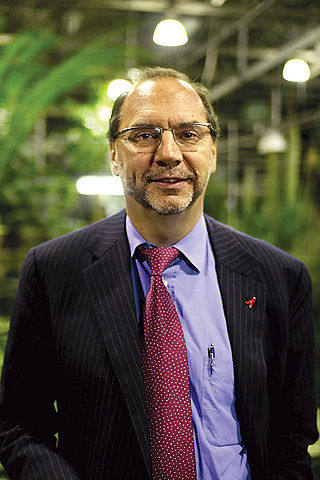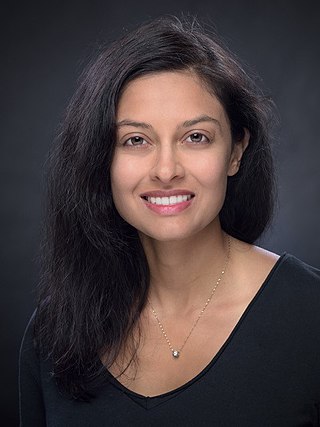
Simon Fraser University (SFU) is a public research university in British Columbia, Canada, with three campuses, all in Greater Vancouver: Burnaby, Surrey, and Vancouver. The 170-hectare (420-acre) main Burnaby campus on Burnaby Mountain, located 15 kilometres (9.3 mi) from downtown Vancouver, was established in 1965 and comprises more than 30,000 students and 160,000 alumni. The university was created in an effort to expand higher education across Canada.

Sir Peter Karel, Baron Piot, is a Belgian-British microbiologist known for his research into Ebola and AIDS.

Laurie Garrett is an American science journalist and author. She was awarded the Pulitzer Prize for Explanatory Journalism in 1996 for a series of works published in Newsday that chronicled the Ebola virus outbreak in Zaire.

A public health emergency of international concern is a formal declaration by the World Health Organization (WHO) of "an extraordinary event which is determined to constitute a public health risk to other States through the international spread of disease and to potentially require a coordinated international response", formulated when a situation arises that is "serious, sudden, unusual, or unexpected", which "carries implications for public health beyond the affected state's national border" and "may require immediate international action". Under the 2005 International Health Regulations (IHR), states have a legal duty to respond promptly to a PHEIC. The declaration is publicized by an IHR Emergency Committee (EC) of international experts, which was developed following the 2002–2004 SARS outbreak.

Devi Lalita Sridhar FRSE is an American public health researcher, who is both professor and chair of global public health at the University of Edinburgh, Scotland. Her research considers the effectiveness of public health interventions and how to improve developmental assistance for health. Sridhar directs the University of Edinburgh's Global Health Governance Programme which she established in 2014.

Michael Joseph Ryan is an Irish epidemiologist and former trauma surgeon, specialising in infectious disease and public health. He is executive director of the World Health Organization's Health Emergencies Programme, leading the team responsible for the international containment and treatment of COVID-19. Ryan has held leadership positions and has worked on various outbreak response teams in the field to eradicate the spread of diseases including bacillary dysentery, cholera, Crimean–Congo hemorrhagic fever, Ebola, Marburg virus disease, measles, meningitis, relapsing fever, Rift Valley fever, SARS, and Shigellosis.

Bruce Aylward is a Canadian physician and epidemiologist. Since September 2017 he has been Senior Advisor to the Director-General of the World Health Organization. He is part of the implementation of the WHO's COVAX Facility. He has past experience in the areas of polio eradication, Zika virus, and Ebola.
Trudie Lang is a Professor of Global Health Research at the University of Oxford. She specialises in clinical trials research capacity building in low-resource setting, and helped to organise the trial for the drug brincidofovir during the 2014 Ebola virus outbreak.
Azra Catherine Hilary Ghani is a British epidemiologist who is a professor of Infectious Disease Epidemiology at Imperial College London. Her research considers the mathematical modelling of infectious diseases, including malaria, bovine spongiform encephalopathy and coronavirus. She has worked with the World Health Organization on their technical strategy for malaria. She is associate director of the MRC Centre for Global Infectious Disease Analysis.
Maria DeJoseph Van Kerkhove is an American infectious disease epidemiologist. With a background in high-threat pathogens, Van Kerkhove specializes in emerging and re-emerging infectious diseases and is based in the Health Emergencies Program at the World Health Organization (WHO). She is the technical lead of COVID-19 response and the head of emerging diseases and zoonosis unit at WHO.

Bonnie J. Fraser Henry is a Canadian epidemiologist, physician, and public servant who has been the provincial health officer at the British Columbia Ministry of Health since 2014. Henry is also a clinical associate professor at the University of British Columbia. She is a specialist in public health and preventive medicine, and is a family doctor. In her role as provincial health officer, Henry notably led the response to COVID-19 in British Columbia (BC).

Caitlin M. Rivers is an American epidemiologist who as Senior Scholar at the Johns Hopkins Center for Health Security and assistant professor at the Johns Hopkins Bloomberg School of Public Health, specializing on improving epidemic preparedness. Rivers is currently working on the American response to the COVID-19 pandemic with a focus on the incorporation of infectious disease modeling and forecasting into public health decision making.
Alexandra Louise Phelan is an associate professor at Johns Hopkins Bloomberg School of Public Health and senior scholar at the Johns Hopkins Center for Health Security. She specializes in international legal and policy issues that are related to emerging and reemerging infectious diseases, including upstream drivers of disease emergence like climate change.
Allison Joan McGeer is a Canadian infectious disease specialist in the Sinai Health System, and a professor in the Department of Laboratory Medicine and Pathobiology at the University of Toronto. She also appointed at the Dalla Lana School of Public Health and a Senior Clinician Scientist at the Lunenfeld-Tanenbaum Research Institute, and is a partner of the National Collaborating Centre for Infectious Diseases. McGeer has led investigations into the severe acute respiratory syndrome outbreak in Toronto and worked alongside Donald Low. During the COVID-19 pandemic, McGeer has studied how SARS-CoV-2 survives in the air and has served on several provincial committees advising aspects of the Government of Ontario's pandemic response.
Helen Branswell is a Canadian infectious diseases and global health reporter at Stat News. Branswell spent fifteen years as a medical reporter at The Canadian Press, where she led coverage of the Ebola, Zika, SARS and swine flu pandemics. She joined Stat News at its founding 2015, leading the website's coverage of the ongoing COVID-19 pandemic.
Eleanor N. Fish is a Canadian immunologist who is a Professor of Immunology at the University of Toronto. Her research considers how cytokines and chemokines interact with receptors in cells and tissue. During the COVID-19 pandemic, Fish tested interferon-alpha as a treatment for coronavirus disease.
Helena Legido-Quigley is a Spanish public health researcher who is an associate professor in Health Systems at Saw Swee Hock School of Public Health at the National University of Singapore. She serves as an associate fellow of Chatham House and is a member of the Council of the World Economic Forum. She is editor-in-chief of Elsevier's Journal of Migration and Health.

Caroline Colijn is a Canadian mathematician and epidemiologist. She holds a Canada 150 Research Chair in Mathematics for Evolution, Infection and Public Health at Simon Fraser University (SFU).

Saskia Popescu is an infectious disease epidemiologist and global health security expert in Phoenix, Arizona. She is an Assistant Professor of epidemiology at the University of Maryland, and holds academic appointments at the University of Arizona and George Mason University’s Schar School of Policy and Government, where she lectures on biopreparedness and outbreak response. Since the start of the Coronavirus disease 2019 pandemic, Popescu has worked to prepare for and mitigate the spread of the disease within healthcare and the entertainment industry, where she led the global epidemiology and infection prevention response for Netflix. She has been recognized for her communication efforts around the pandemic, as well as her work on the front lines in infection prevention and healthcare biopreparedness. Popescu currently is a Senior Fellow at the Council on Strategic Risks, addressing converging biological risks from biological weapons nonproliferation, biosecurity, emerging infectious diseases and ecological security, biopreparedness in private industry, and global health security vulnerabilities.
Suerie Moon is a Korean American public health expert who is Professor of Practice at the Graduate Institute of International and Development Studies. Her research considers global health, health equity and pandemic preparedness.











